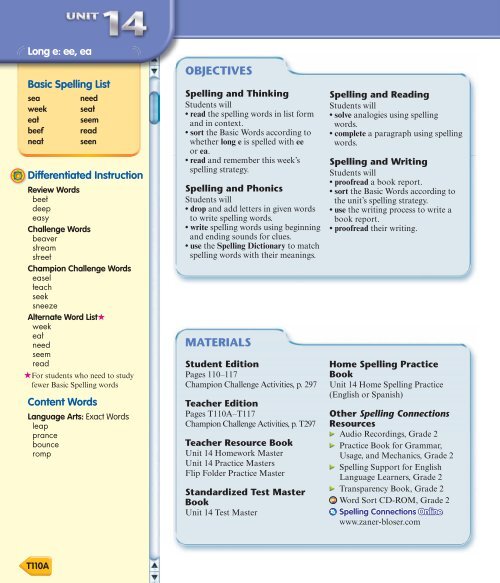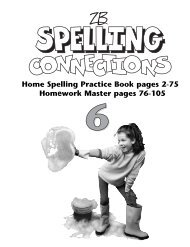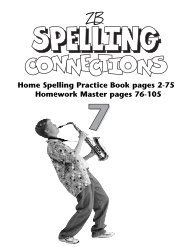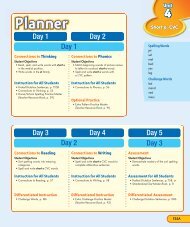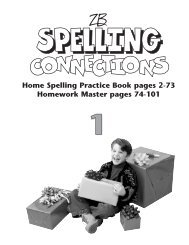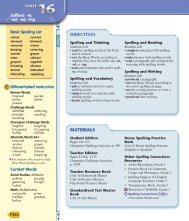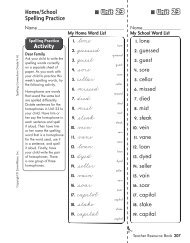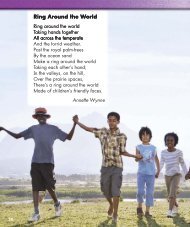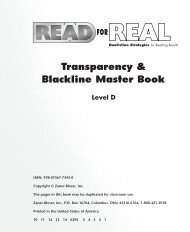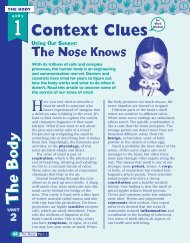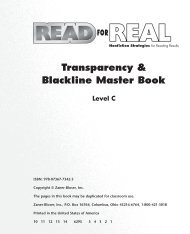Spelling Connections - Zaner-Bloser
Spelling Connections - Zaner-Bloser
Spelling Connections - Zaner-Bloser
You also want an ePaper? Increase the reach of your titles
YUMPU automatically turns print PDFs into web optimized ePapers that Google loves.
Long e: ee, ea<br />
Basic <strong>Spelling</strong> List<br />
sea need<br />
week seat<br />
eat seem<br />
beef read<br />
neat seen<br />
Differentiated Instruction<br />
Review Words<br />
beet<br />
deep<br />
easy<br />
Challenge Words<br />
beaver<br />
stream<br />
street<br />
Champion Challenge Words<br />
easel<br />
teach<br />
seek<br />
sneeze<br />
Alternate Word List★<br />
week<br />
eat<br />
need<br />
seem<br />
read<br />
★ For students who need to study<br />
fewer Basic <strong>Spelling</strong> words<br />
Content Words<br />
Language Arts: Exact Words<br />
leap<br />
prance<br />
bounce<br />
romp<br />
T110A<br />
OBJECTIVES<br />
<strong>Spelling</strong> and Thinking<br />
Students will<br />
read the spelling words in list form<br />
and in context.<br />
sort the Basic Words according to<br />
whether long e is spelled with ee<br />
or ea.<br />
read and remember this week’s<br />
spelling strategy.<br />
<strong>Spelling</strong> and Phonics<br />
Students will<br />
drop and add letters in given words<br />
to write spelling words.<br />
write spelling words using beginning<br />
and ending sounds for clues.<br />
use the <strong>Spelling</strong> Dictionary to match<br />
spelling words with their meanings.<br />
MATERIALS<br />
Student Edition<br />
Pages 110–117<br />
Champion Challenge Activities, p. 297<br />
Teacher Edition<br />
Pages T110A–T117<br />
Champion Challenge Activities, p. T297<br />
Teacher Resource Book<br />
Unit 14 Homework Master<br />
Unit 14 Practice Masters<br />
Flip Folder Practice Master<br />
Standardized Test Master<br />
Book<br />
Unit 14 Test Master<br />
<strong>Spelling</strong> and Reading<br />
Students will<br />
solve analogies using spelling<br />
words.<br />
complete a paragraph using spelling<br />
words.<br />
<strong>Spelling</strong> and Writing<br />
Students will<br />
proofread a book report.<br />
sort the Basic Words according to<br />
the unit’s spelling strategy.<br />
use the writing process to write a<br />
book report.<br />
proofread their writing.<br />
Home <strong>Spelling</strong> Practice<br />
Book<br />
Unit 14 Home <strong>Spelling</strong> Practice<br />
(English or Spanish)<br />
Other <strong>Spelling</strong> <strong>Connections</strong><br />
Resources<br />
Audio Recordings, Grade 2<br />
Practice Book for Grammar,<br />
Usage, and Mechanics, Grade 2<br />
<strong>Spelling</strong> Support for English<br />
Language Learners, Grade 2<br />
Transparency Book, Grade 2<br />
Word Sort CD-ROM, Grade 2<br />
<strong>Spelling</strong> <strong>Connections</strong> Online<br />
www.zaner-bloser.com
3–5 Day Plan Average Below Average Above Average<br />
Visual<br />
Write ee in red on an<br />
index card and ea in blue<br />
on another. Then write the spelling<br />
words on index cards, leaving<br />
out the ea or ee spelling in<br />
each. Have each student take a<br />
turn matching the correct spelling<br />
to an incomplete word. The<br />
students should then write the<br />
word.<br />
The long e sound may be diffi cult for some students to<br />
hear or pronounce because of regional speech differences<br />
or language backgrounds that do not include<br />
this sound or that spell it differently. In Spanish, for<br />
example, this sound is spelled by the letter i. If a student<br />
has diffi culty hearing or pronouncing a word with this<br />
sound, fi rst make sure that he or she knows the meaning<br />
of the word.<br />
Write each spelling word on the board. Say each word<br />
clearly. Point out that all the words have the long e<br />
Pacing Guide<br />
Pretest Pretest Pretest<br />
Day 1 <strong>Spelling</strong> Mini-Lesson, p. T110 <strong>Spelling</strong> Mini-Lesson, p. T110 <strong>Spelling</strong> and Thinking, p. 110<br />
<strong>Spelling</strong> and Thinking, p. 110 <strong>Spelling</strong> and Thinking, p. 110<br />
Day 1<br />
Day 2<br />
<strong>Spelling</strong> and Phonics, p. 111 <strong>Spelling</strong> and Phonics, p. 111 (or) <strong>Spelling</strong> and Phonics, p. 111<br />
Unit 14 Practice Master, A and B <strong>Spelling</strong> and Reading, p. 112<br />
Day 3<br />
<strong>Spelling</strong> and Reading, p. 112 <strong>Spelling</strong> and Reading, p. 112 (or) Challenge Activities, p. 115<br />
Unit 14 Practice Master, C and D Champion Challenge Activities, p. 297<br />
Day 2 Review Activities, p. 114<br />
Day 4 <strong>Spelling</strong> and Writing, p. 113 <strong>Spelling</strong> and Writing, p. 113 <strong>Spelling</strong> and Writing, p. 113<br />
Unit 14 Homework Master Unit 14 Homework Master<br />
Day 3 Day 5 Weekly Test Weekly Test Weekly Test<br />
<strong>Spelling</strong> and Technology Activities (pages 116 and 117) may be used anytime during this unit.<br />
Learning Styles<br />
Auditory<br />
Do the visual activity,<br />
but have the student<br />
say a spelling word into a tape<br />
recorder, listen to the word, and<br />
match it with the incomplete<br />
word. The student should then<br />
spell aloud the entire word as he<br />
or she writes it on paper.<br />
Hands-On Practice<br />
All students will benefit from<br />
practicing with a Flip Folder.<br />
See page Z13.<br />
Language and Cultural Differences<br />
DI FFE R E NTIATE D<br />
Kinesthetic<br />
Cut out e, e, and a from<br />
oaktag or heavy paper.<br />
On construction paper, write<br />
incomplete spelling words that<br />
are large enough to accommodate<br />
two of the cut-out vowels.<br />
Let each student take a turn putting<br />
the appropriate letters in an<br />
incomplete word, tracing around<br />
each vowel with pencil, then<br />
coloring ee red and ea blue. The<br />
students should then write the<br />
completed word on paper.<br />
sound spelled with ea or ee. Have the students repeat<br />
each word. Ask the students to use the words in sentences<br />
or to tell something about the meanings of the words.<br />
Then give a defi nition and ask the students to name the<br />
spelling word that matches it. Have the students write the<br />
word. The students may check their spelling by looking<br />
at the board.<br />
Draw two boxes on the board. Say each spelling word.<br />
Have the students take turns writing the words in the<br />
boxes, ea words in one box and ee words in the other.<br />
O N<br />
I N S T R U C T I<br />
T110B
Objectives<br />
<strong>Spelling</strong> and Thinking<br />
Students will<br />
read the spelling words in list form<br />
and in context.<br />
sort the Basic Words according to<br />
whether long e is spelled with ee<br />
or ea.<br />
read and remember this week’s<br />
spelling strategy.<br />
Unit Pretest<br />
Use the Pretest Sentences below. Pretest<br />
Sentences for the Review and Challenge<br />
Words can be found on pages T114 and<br />
T115. Refer to the self-checking procedures<br />
on student page 8. You may wish to use the<br />
Unit 14 Word List Overhead Transparency<br />
as part of the checking process.<br />
Students who need to study fewer words<br />
should use the Alternate Word List,<br />
shown by the ★.<br />
Teaching the Strategy<br />
<strong>Spelling</strong> Mini-Lesson<br />
STEP 1: Write eat and seen on the board.<br />
Underline the digraph (ea or ee) in each<br />
word. Point out that in these words, ea<br />
and ee both spell the long e sound.<br />
STEP 2: Challenge students to find the<br />
word on the spelling list that, depending<br />
on how it is used, is pronounced with the<br />
long e sound or the short e sound.<br />
STEP 3: If students do not identify read,<br />
write these sentences on the board:<br />
Can he read the book?<br />
I read it last week.<br />
Have volunteers read the sentences aloud.<br />
Point out that even though the vowel<br />
sound changes, the spelling does not.<br />
T110<br />
Remind students to watch out<br />
for easily misspelled words.<br />
You may wish to use the Word Sort<br />
CD-ROM for hands-on sorting.<br />
Order of answers may vary.<br />
ee<br />
1. week★<br />
2. beef<br />
3. need★<br />
4. seem★<br />
5. seen<br />
ea<br />
6. sea<br />
7. eat★<br />
8. neat<br />
9. seat<br />
10. read★<br />
Long e: ee, ea<br />
110<br />
READ the Basic Words Watch out for easily misspelled words!<br />
1. sea<br />
2. week<br />
3. eat<br />
4. beef<br />
5. neat<br />
6. need<br />
7. seat<br />
8. seem<br />
9. read<br />
10. seen<br />
Fish swim in the sea.<br />
The school week begins today.<br />
You may eat this apple.<br />
Dad likes beef for dinner.<br />
Please keep your room neat.<br />
I need to drink some water.<br />
Have a seat on the sofa.<br />
Those people seem nice.<br />
I can read this book.<br />
Have you seen my cat?<br />
Review Challenge<br />
11. beet 13. easy 14. beaver 16. street<br />
12. deep<br />
15. stream<br />
SORT the Basic Words<br />
The words on the spelling list have the long e<br />
sound.<br />
1–5. Write the spelling words with the long e<br />
sound spelled ee.<br />
6–10. Write the spelling words with the long e<br />
sound spelled ea.<br />
REMEMBER the <strong>Spelling</strong> Strategy<br />
The long e sound can be spelled in different ways:<br />
ee in seen and ea in eat.<br />
Pretest Sentences (See procedures on page Z12.)<br />
★ 1. There are seven days in a week.<br />
★ 2. Do you like to eat cereal for breakfast?<br />
★ 3. The flowers will need watering soon.<br />
★ 4. Does it seem hotter today than it was yesterday?<br />
★ 5. Shameka likes to read books about tigers.<br />
6. We watched the ships sail out to sea.<br />
7. Meat from a cow is called beef.<br />
8. Your bedroom should be kept neat.<br />
9. I found an empty seat in the theater.<br />
10. Have you seen this magic trick?
Sound and Letter Patterns<br />
Follow the directions to write<br />
a Basic Word.<br />
1. seen – n + m = _____<br />
2. sea – a + en = _____<br />
3. really – lly + d = _____<br />
4. weed – d + k = _____<br />
5. sell – ll + a = _____<br />
Unit 14<br />
Practice Masters<br />
Beginning and Ending Sounds<br />
6. Write the Basic Word that begins like need<br />
and ends like meat.<br />
7. Write the Basic Word that begins with the<br />
long e sound.<br />
8. Write the Basic Word that begins like see<br />
and ends like beat.<br />
Write the Basic Word for each dictionary<br />
meaning.<br />
9. kind of meat 10. must have<br />
<br />
Dictionary Check Be sure to check your<br />
word meanings in your <strong>Spelling</strong> Dictionary.<br />
Copyright © <strong>Zaner</strong>-<strong>Bloser</strong>, Inc. <strong>Spelling</strong> <strong>Connections</strong> Grade 2<br />
Name<br />
1. eat 2. read<br />
Name<br />
3. need 4. seem 5. week<br />
U n i t<br />
Practice Master<br />
eat read need seem week<br />
A. Write the spelling word that answers each word math<br />
problem.<br />
1. seat – s = ____<br />
2. seen – n + m = ____<br />
3. we + ek = ____<br />
4. real – l + d = ____<br />
5. seed – s + n = ____<br />
U n i t<br />
Practice Master<br />
C. Write the spelling word that goes with each clue.<br />
IJKLKLKLKLKLKLKLKLKLKLKLKLKLKLKLKLKLKLKLKLKLKL<br />
1. One of these has seven days. IJKLKLKLKLKLKLKLKLKLKLKLKLKLKLKLKL<br />
IJKLKLKLKLKLKLKLKLKLKLKLKLKLKLKLKLKLKLKLKLKLKL<br />
2. You should do this to labels. IJKLKLKLKLKLKLKLKLKLKLKLKLKLKLKLKL<br />
IJKLKLKLKLKLKLKLKLKLKLKLKLKLKLKLKLKLKLKLKLKLKL<br />
3. This word means “must have.” IJKLKLKLKLKLKLKLKLKLKLKLKLKLKLKLKL<br />
IJKLKLKLKLKLKLKLKLKLKLKLKLKLKLKLKLKLKLKLKLKLKL<br />
4. What you do with food. IJKLKLKLKLKLKLKLKLKLKLKLKLKLKLKLKL<br />
IJKLKLKLKLKLKLKLKLKLKLKLKLKLKLKLKLKLKLKLKLKLKL<br />
D. Use the code to find spelling words. Write the words.<br />
B. Look at these symbols: ♥ = ea ❦ = ee<br />
Write the spelling words that these letters and symbols CODE spell.<br />
a d e k m n r s t w<br />
1. n ❦ d 4. r ♥ d1<br />
2 3 4 5 6 7 8 9 10<br />
IJKLKLKLKLKLKLKLKLKLKLKL IJKLKLKLKLKLKLKLKLKLKLKL<br />
IJKLKLKLKLKLKLKLKLKLKLKL n e eIJKLKLKLKLKLKLKLKLKLKLKL<br />
d<br />
IJKLKLKLKLKLKLKLKLKLKLKL r e a d<br />
2. w ❦ k 1. 5. s ❦ m<br />
4.<br />
6 3 3 2 10 3 3 4<br />
3. ♥ t<br />
2. 5.<br />
3.<br />
7<br />
e<br />
3<br />
a<br />
1<br />
t<br />
2 8<br />
37<br />
3 3 5<br />
3 1 9<br />
38<br />
The Unit 14 Practice Masters (Teacher Resource Book)<br />
provide additional practice with the Alternate Word List.★<br />
14<br />
w<br />
s<br />
e<br />
e<br />
e<br />
e<br />
k<br />
m<br />
14<br />
Sound and Letter Patterns<br />
1. seem<br />
2. seen<br />
3. read<br />
4. week<br />
5. sea<br />
Beginning and Ending Sounds<br />
6. neat<br />
7. eat<br />
8. seat<br />
Using the Dictionary<br />
9. beef<br />
10. need<br />
<strong>Spelling</strong> <strong>Connections</strong> Grade 2<br />
Copyright © <strong>Zaner</strong>-<strong>Bloser</strong>, Inc.<br />
111<br />
Objectives<br />
<strong>Spelling</strong> and Phonics<br />
Students will<br />
drop and add letters in given words<br />
to write spelling words.<br />
write spelling words using beginning<br />
and ending sounds for clues.<br />
use the <strong>Spelling</strong> Dictionary to<br />
match spelling words with their<br />
meanings.<br />
Developing Oral<br />
Language Skills<br />
Ask the students to fi nd and say the<br />
spelling words that rhyme with eat. (seat,<br />
neat) Then ask them to fi nd and say the<br />
word that rhymes with read. (need) Ask<br />
them to think of words that rhyme with<br />
each of the following spelling words and<br />
say them aloud: sea, seen, seem, week, and<br />
beef. (Possible responses: tea, flea,<br />
queen, keen, cream, seek, peek, leaf)<br />
Encourage the students to use these words<br />
to create tongue twisters, such as “The<br />
queen and the fl ea went to sea to drink<br />
tea.” The children should say the tongue<br />
twisters as quickly as possible.<br />
Differentiated Instruction<br />
Providing More Help<br />
Draw a picture of an open book on the<br />
board. Write eat, sea, seat, neat, and<br />
read on one page and need, seen, seem,<br />
week, and beef on the other. Have the<br />
students read each word, tell how the<br />
long e sound is spelled in each, and<br />
trace over the vowels with chalk of<br />
different colors.<br />
T1115
Objectives<br />
<strong>Spelling</strong> and Reading<br />
Students will<br />
solve analogies using spelling words.<br />
complete a paragraph using spelling<br />
words.<br />
Legible handwriting can boost<br />
spelling scores by as much as 20%.<br />
Weekly Test Options<br />
Option 1: One <strong>Spelling</strong> Word Per Sentence<br />
(See procedures on page Z12.)<br />
★ 1. Crack the nut and eat it.<br />
★ 2. Does the doctor need the help of a nurse?<br />
★ 3. Can you read if I sing at the same time?<br />
★ 4. Does a day seem like a long time to you?<br />
★ 5. His team won the race a week ago.<br />
T112<br />
One-Minute<br />
Handwriting Hint<br />
PAPER POSITION (Manuscript)<br />
LEFT-<br />
HANDED<br />
RIGHT-HANDED<br />
Solve the Analogies<br />
1. beef<br />
2. eat<br />
3. neat<br />
4. read<br />
5. sea<br />
Complete the Paragraph<br />
6. week<br />
7. seat<br />
8. seen<br />
9. need<br />
10. seem<br />
112<br />
sea week eat beef neat<br />
need seat seem read seen<br />
Solve the Analogies Write a Basic Word to<br />
complete each analogy.<br />
1. Pig is to pork as cow is to _____.<br />
2. Cup is to drink as fork is to _____.<br />
3. Fat is to thin as messy is to _____.<br />
4. Video is to watch as book is to _____.<br />
5. Soil is to water as land is to _____.<br />
Complete the Paragraph Write the Basic<br />
Words that complete the paragraph.<br />
Dad and I take a bus ride when we want to<br />
see Grandma. We can go any day of the 6. .<br />
I like to ride in the back 7. . From the window,<br />
I have 8. trucks, bridges, and tall buildings.<br />
When we 9. to go home, we take the bus<br />
again. Does it 10. like riding on a bus is fun?<br />
It is!<br />
6. The beef will thaw on the stove.<br />
7. The room is as neat as a pin.<br />
8. The sea has been still.<br />
9. Gabriel will take the seat next to me.<br />
10. Have you seen the monkeys at the zoo?<br />
Students who need to study fewer words should<br />
use the Alternate Word List, shown by the ★.
Proofread a Book Report<br />
First, proofread the book report below for eight<br />
misspelled words. Then rewrite the book report.<br />
Write the spelling words correctly and make the<br />
corrections shown by the proofreading marks.<br />
Sea<br />
A Seea Story<br />
read<br />
You should reed this book! It is called Sea Life. It is by Ian<br />
W<br />
y<br />
seen<br />
whitelaw. It tells about sea animals You have never sean.<br />
seem<br />
Some are so strange! They don’t even seam real. You will<br />
eat<br />
learn what they look like and what they eet It is so good,<br />
week Y need<br />
I read this this book twice a weeke. you really nead to take<br />
seat<br />
b<br />
a seet and read this Book!<br />
More Practice Write and sort the Basic Words.<br />
Write a Book Report<br />
Write a book report. Explain why someone else<br />
should read the book. Be sure to tell the title and<br />
author. Say what the book is about. Tell why it is<br />
worth reading. Use as many spelling words as<br />
you can.<br />
When you fi nish writing your draft, proofread your<br />
paper for errors in spelling, grammar, capitalization, and<br />
punctuation. Use the <strong>Spelling</strong> Dictionary to check spelling if<br />
you are not sure.<br />
Option 2: Multiple <strong>Spelling</strong> Words Per Sentence<br />
(See procedures on page Z12.)<br />
1. Does a tiger eat beef?<br />
2. Some days may seem like a week.<br />
3. I have seen big ships on the sea.<br />
4. Keep the seat on the bus neat.<br />
5. I feel a need to read.<br />
113<br />
Unit 14<br />
Test Master<br />
Objectives<br />
<strong>Spelling</strong> and Writing<br />
Students will<br />
proofread a book report.<br />
sort the Basic Words according to<br />
the unit’s spelling strategy. See<br />
pp. Z14–Z15 in the Teacher Edition<br />
for more information.<br />
use the writing process to write a<br />
book report.<br />
proofread their writing.<br />
Using the<br />
Writing Process<br />
Before assigning Write a Book Report in<br />
this unit, see pages 316–317 in the Student<br />
Edition for a complete review of the writing<br />
process and additional writing assignments.<br />
You may also wish to refer to page Z13 in<br />
the Teacher Edition.<br />
Keeping a<br />
<strong>Spelling</strong> Journal<br />
Encourage students to record the words<br />
they misspelled on the weekly test in a personal<br />
spelling journal. These words may be<br />
recycled for future study. Students may also<br />
wish to include words from their writing. See<br />
page Z13 in the Teacher Edition for more<br />
information.<br />
You may wish to use the Unit 14 Proofreading<br />
Every Day Overhead Transparency for more<br />
proofreading practice.<br />
Option 3: Standardized Test<br />
(See Standardized Test Master Book, Unit 14.)<br />
Name<br />
Test<br />
U n i t<br />
Master<br />
Read each sentence. Look at the underlined spelling word.<br />
Fill in a circle. Show if the word is spelled Right or Wrong.<br />
✎ Sample<br />
I wish I could leep like a frog.<br />
Right Wrong<br />
1. She sits in the front seet on the bus.<br />
2. I will nead your help to mend this dress.<br />
3. Dad would like to eet some fish.<br />
4. Sue will call me next week.<br />
5. Have you seen the black crayon?<br />
6. This beef is cut very thin.<br />
7. Did you read this book yet?<br />
8. The boat went out to sea.<br />
9. Does it seem like Friday?<br />
10. I keep my room neet at all times.<br />
16<br />
14<br />
Answer Box<br />
Right Wrong<br />
1.<br />
2.<br />
3.<br />
4.<br />
5.<br />
6.<br />
7.<br />
8.<br />
9.<br />
10.<br />
<strong>Spelling</strong> <strong>Connections</strong> Grade 2<br />
Copyright © <strong>Zaner</strong>-<strong>Bloser</strong>, Inc.<br />
T113
DI FFE R E NTIATE D<br />
Objectives<br />
Review<br />
Students will<br />
review words studied previously<br />
that are related to the<br />
spelling strategy.<br />
match Review Words to clues.<br />
replace underlined words<br />
with Review Words.<br />
understand and identify<br />
homophones.<br />
Providing More Help<br />
Remind students that the Review Words<br />
are related to the spelling patterns they<br />
have studied in this unit. The Review<br />
Words are below grade level. You may<br />
wish to use the Pretest Sentences to introduce<br />
the words in context.<br />
Review Words:<br />
Pretest Sentences<br />
1. A beet is red.<br />
2. How deep is the snow in your yard?<br />
3. The game is easy to play.<br />
Word Study<br />
Homophones<br />
Write words such as these on the board:<br />
weak, knead, seam, see. Challenge students<br />
to suggest a homophone for each one. (If<br />
necessary, point out that the homophones<br />
are in this week’s word list.) Be aware of students’<br />
use of homophones in their writing.<br />
T114<br />
O N<br />
I N S T R U C T I<br />
Use the Clues<br />
1. easy<br />
2. beet<br />
3. deep<br />
Replace the Words<br />
4. easy<br />
5. beet<br />
6. deep<br />
Homophones<br />
1. beet<br />
Long e: ee, ea<br />
114<br />
beet deep easy<br />
Use the Clues Write a Review Word for each<br />
clue.<br />
1. This word means the opposite of “hard.”<br />
2. This word names something you can eat.<br />
3. This word can describe a hole.<br />
Replace the Words Write the Review Word<br />
that could best take the place of the underlined<br />
word or words in each sentence.<br />
4. The science test we took was not diffi cult.<br />
5. She sliced a vegetable into her salad.<br />
6. The pirate hid his treasure far in the dark<br />
cave.<br />
Word Study: Homophones<br />
Words that sound alike but have different<br />
spellings and meanings are homophones.<br />
Eight and ate are homophones. Write the<br />
Review Word that is a homophone for beat.
eaver stream street<br />
Sound and Letter Patterns Write a<br />
Challenge Word by adding the missing letters.<br />
1. str ___ a ___<br />
2. be ___ v ___ r<br />
3. s ___ r ___ et<br />
Use the Clues Write the Challenge Word for<br />
each clue.<br />
4. I am a place where people drive.<br />
5. I am a place where fi sh and frogs live.<br />
6. I am an animal that builds a dam.<br />
Do you think you’ve mastered the <strong>Spelling</strong> Strategy?<br />
Take the CHAMPION CHALLENGE on page 297!<br />
CHAMPION CHALLENGE<br />
<br />
A. <br />
<br />
1. <br />
2. <br />
3.<br />
4.<br />
B. <br />
<br />
1. 2. 3. 4.<br />
C. <br />
<br />
<br />
<br />
O N<br />
I N S T R U C T I<br />
• DI FFE R E NTIATE D •<br />
Sound and Letter Patterns<br />
1. stream<br />
2. beaver<br />
3. street<br />
Use the Clues<br />
4. street<br />
5. stream<br />
6. beaver<br />
115<br />
Providing Extra Challenge<br />
Champion Challenge Words and<br />
Champion Challenge Activities<br />
for Unit 14 appear on page 297.<br />
Champion Challenge Word Test<br />
Sentences appear on page T297.<br />
Unit 14<br />
Champion Challenge Activities<br />
Objectives<br />
Challenge<br />
Students will<br />
preview unknown words that<br />
are related to the spelling<br />
strategy.<br />
add letters to make Challenge<br />
Words.<br />
match Challenge Words to<br />
clues.<br />
Providing More Challenge<br />
Remind students that the Challenge Words<br />
are related to the spelling patterns they<br />
have studied in this unit. The Challenge<br />
Words are above grade level. You may wish<br />
to use the Pretest Sentences to introduce<br />
the words in context.<br />
Challenge Words:<br />
Pretest Sentences<br />
DI FFE R E NTIATE D<br />
1. A beaver cut down the tree with its<br />
teeth.<br />
2. The stream has many fish in it.<br />
3. We watched the parade go down the<br />
street.<br />
You may wish to use the Word Sort<br />
CD-ROM for hands-on sorting.<br />
O N<br />
I N S T R U C T I<br />
T115
Objectives<br />
<strong>Spelling</strong> and Technology<br />
Students will<br />
expand vocabulary with<br />
technology-related words.<br />
relate the spelling strategy<br />
to words outside the Basic<br />
<strong>Spelling</strong> list.<br />
learn the consequences of a<br />
computer freeze or crash.<br />
Teaching About…<br />
Computer Crashes<br />
Ask students if they know the meaning<br />
of the word crash. Ask volunteers to<br />
explain what happens when something<br />
crashes. Have them speculate about what<br />
happens when a computer crashes. If a<br />
student has experienced such a problem<br />
with his or her computer, ask the student<br />
to tell the class what happened.<br />
You may wish to use these sentences to<br />
introduce the words and their meanings.<br />
1. Modern computers do not crash as<br />
often as the older models.<br />
2. I hope the problem won’t cause the<br />
computer to delete the file.<br />
3. If you have a computer freeze, just<br />
turn it off and start over again.<br />
Take It Online<br />
Have students review any files on their<br />
hard drive and save a copy on a disk<br />
of any documents they want to protect<br />
against a computer crash.<br />
Note: The listed Web sites have been<br />
carefully researched for accuracy, content,<br />
and appropriateness. However, Web<br />
sites are subject to change. Internet use<br />
should always be carefully monitored.<br />
T116<br />
<strong>Spelling</strong> and Technology<br />
1. freeze<br />
2. delete<br />
3. crash<br />
116<br />
Unit14<br />
Recap<br />
You may wish to assign the<br />
Unit 14 Homework Master<br />
(Teacher Resource Book,<br />
Unit 14) as a fun way to<br />
recap the spelling words.<br />
Computer Crash!<br />
Sometimes, your computer doesn’t<br />
work. The screen might freeze. You<br />
can’t select anything. You can’t type<br />
anything. This is called a crash.<br />
Usually, you can delete, or get rid of,<br />
work that you don’t want. When you<br />
have a crash, the computer might delete<br />
work that you do want!<br />
Learn these words for what could<br />
happen to your work.<br />
crash delete freeze<br />
Write the word from the box that<br />
completes each sentence. Underline<br />
the word that spells long e with ee.<br />
1. Everything stops when computers<br />
_____.<br />
2. A crash can make your computer<br />
_____ your work.<br />
3. A computer _____ can be a big<br />
problem!<br />
Unit 14 Homework Master<br />
Copyright © <strong>Zaner</strong>-<strong>Bloser</strong>, Inc. <strong>Spelling</strong> <strong>Connections</strong> Grade 2<br />
Name<br />
U n i t<br />
Homework Master<br />
Use the code to find the spelling words in this unit.<br />
CODE<br />
1. e 7. w<br />
2. s 8. t<br />
3. r 9. b<br />
4. a 10. m<br />
5. k 11. f<br />
6. n 12. d<br />
e<br />
14<br />
1 4 8 3 1 4 12 7 1 1 5<br />
n<br />
6 1 4 8 2 1 1 6 2 1 4<br />
s<br />
a<br />
e<br />
e<br />
t<br />
a<br />
a<br />
2 1 4 8 2 1 1 10 6 1 1 12<br />
One spelling word is missing.<br />
Write the word.<br />
t<br />
t<br />
r<br />
s<br />
e<br />
e<br />
a<br />
e<br />
d<br />
n<br />
s e e m<br />
w e<br />
n<br />
s<br />
e<br />
e<br />
e<br />
e<br />
k<br />
a<br />
d<br />
IJKLKLKLKLKLKLKLKLKLKLKLKLKLKLKLKL<br />
39
Content Words<br />
Language Arts: Exact Words<br />
Write the Content Word that has the same<br />
meaning as the underlined word or words.<br />
leap prance bounce romp<br />
1. The squirrel seems to jump from one tree to<br />
another.<br />
2. I can throw down and catch a ball for a<br />
long time.<br />
3. The children laugh and play in the yard<br />
after school.<br />
4. Come look over the fence! Watch the horse<br />
lift its feet high.<br />
The <strong>Spelling</strong> Strategy<br />
Circle the letters that spell the long e sound in<br />
one of the Content Words you wrote.<br />
Content Connection: Language Arts<br />
Search the Internet to learn more about<br />
words. Try www.playkidsgames.com. Click on<br />
Vocabulary Games. Play Vocabulary Pinball.<br />
Write three words you make.<br />
Unit15<br />
Looking Ahead<br />
To save time, you may wish to<br />
duplicate the Unit 15 Home<br />
<strong>Spelling</strong> Practice now. (See Home<br />
<strong>Spelling</strong> Practice Book, Unit 15.)<br />
Copyright © <strong>Zaner</strong>-<strong>Bloser</strong>, Inc. <strong>Spelling</strong> <strong>Connections</strong> Grade 2<br />
Nombre<br />
Long i: y,<br />
i-Consonant-e<br />
Name<br />
Querida<br />
familia:<br />
Pida a su hijo(a) que<br />
escriba correctamente<br />
1.<br />
en las líneas en blanco<br />
las palabras para<br />
deletrear de esta<br />
semana. Al practicar<br />
estas palabras con su<br />
hijo(a), prueben el<br />
siguiente ejercicio.<br />
2.<br />
3.<br />
Dear Family,<br />
Ask your child to write<br />
the spelling words<br />
correctly on the blank<br />
lines. As you work with<br />
your child to practice<br />
this week’s spelling<br />
Sorteo de<br />
words, try the following<br />
palabras Deletreen<br />
cada palabra en una<br />
ficha o en un cuadro<br />
de papel. Pongan las<br />
fichas en un saco.<br />
Escojan una ficha a la<br />
vez y den pistas para la<br />
palabra. Pídanle a su<br />
hijo o hija que nombre<br />
la palabra y luego que<br />
la deletree en voz alta<br />
o que la escriba. Traten<br />
de usar la imaginación<br />
cuando dan las pistas<br />
para hacer el juego<br />
más divertido.<br />
4.<br />
Word Draw Write<br />
each spelling word on<br />
a separate index card<br />
5. or piece of paper. Put<br />
the cards in a paper<br />
bag. Draw one card at<br />
a time and give clues<br />
6. to the word. Ask your<br />
simpático; amable<br />
child to name the<br />
word and spell it or<br />
7. write it. The more<br />
imaginative you are<br />
with this game, the<br />
more fun it will be.<br />
8.<br />
my mi<br />
try<br />
tratar de<br />
mile milla<br />
activity. cry llorar<br />
fry freír<br />
nice<br />
by<br />
por<br />
sky cielo<br />
fine<br />
dry<br />
<strong>Spelling</strong> <strong>Connections</strong> Online<br />
www.zaner-bloser.com<br />
9.<br />
fino; excelente; bien<br />
10.<br />
seco; secar<br />
U n i t<br />
15<br />
Práctica de<br />
ortografía para<br />
el hogar<br />
10.<br />
37<br />
117<br />
Unit 15 Home <strong>Spelling</strong> Practice<br />
Spanish<br />
36<br />
English<br />
Language Arts: Exact Words<br />
1. leap<br />
2. bounce<br />
3. romp<br />
4. prance<br />
U n i t<br />
15<br />
Home <strong>Spelling</strong><br />
Long i: y,<br />
IJKLKLKLKLKLKLKLKLKLKLKLKLKLKL<br />
1. i-Consonant-e<br />
Practice<br />
IJKLKLKLKLKLKLKLKLKLKLKLKLKLKL<br />
2.<br />
1. my IJKLKLKLKLKLKLKLKLKLKLKLKLKLKL<br />
1.<br />
IJKLKLKLKLKLKLKLKLKLKLKLKLKLKL<br />
3.<br />
2. try IJKLKLKLKLKLKLKLKLKLKLKLKLKLKL<br />
2.<br />
IJKLKLKLKLKLKLKLKLKLKLKLKLKLKL<br />
4.<br />
3. mile IJKLKLKLKLKLKLKLKLKLKLKLKLKLKL<br />
3.<br />
IJKLKLKLKLKLKLKLKLKLKLKLKLKLKL<br />
5.<br />
4. cry IJKLKLKLKLKLKLKLKLKLKLKLKLKLKL<br />
4.<br />
IJKLKLKLKLKLKLKLKLKLKLKLKLKLKL<br />
6.<br />
5. fry IJKLKLKLKLKLKLKLKLKLKLKLKLKLKL<br />
5.<br />
IJKLKLKLKLKLKLKLKLKLKLKLKLKLKL<br />
7.<br />
6. nice IJKLKLKLKLKLKLKLKLKLKLKLKLKLKL<br />
6.<br />
IJKLKLKLKLKLKLKLKLKLKLKLKLKLKL<br />
8.<br />
7. by IJKLKLKLKLKLKLKLKLKLKLKLKLKLKL<br />
7.<br />
IJKLKLKLKLKLKLKLKLKLKLKLKLKLKL<br />
9.<br />
8. sky IJKLKLKLKLKLKLKLKLKLKLKLKLKLKL<br />
8.<br />
10. IJKLKLKLKLKLKLKLKLKLKLKLKLKLKL<br />
9. fine IJKLKLKLKLKLKLKLKLKLKLKLKLKLKL<br />
9.<br />
10. dry IJKLKLKLKLKLKLKLKLKLKLKLKLKLKL<br />
<strong>Spelling</strong> <strong>Connections</strong> Grade 2<br />
Copyright © <strong>Zaner</strong>-<strong>Bloser</strong>, Inc.<br />
Objectives<br />
Content Words<br />
Students will<br />
expand vocabulary with<br />
content-related words.<br />
relate the spelling strategy<br />
to words outside the Basic<br />
<strong>Spelling</strong> list.<br />
access the Internet to research<br />
a topic.<br />
Content Words<br />
Language Arts: Exact Words<br />
Use these sentences to introduce the<br />
words and their meanings.<br />
1. He had to leap into the air to catch<br />
the ball.<br />
2. The horses were trained to prance<br />
in the horse show.<br />
3. Do not bounce on the bed.<br />
4. The child likes to romp with the<br />
puppy.<br />
Content Connection<br />
Answers will vary. Students could include<br />
definitions of the words they make.<br />
T117


